From Toronto to Tomsk: summing up and planning future seminars on microelectronics in Russia
See the Japanese robot dog to the left of the girl Irina? This robot from the computer museum at the Google office was controlled by a built-in MIPS R4000 processor. A far descendant of this processor, MIPS microAptiv UP, will be the subject of several reports at a seminar on the exchange of experience in teaching electronics, which will be held in Tomsk next week . The MIPS microAptiv UP kernel, in its free version, MIPSfpga, has become a convenient guinea pig for student experiments on the micro-architecture of processor cores and the creation of systems on a chip.
An important part of the experiments with MIPSfpga happened in Russia, Ukraine and Kazakhstan over the past two years - Sara Harris, professor at the University of Las Vegas, told about this at a conference in Toronto . MSU, MIPT, MEPI, MIET, ITMO and other leading universities took part in the workshops on this and related topics of chip design (Nanometer ASIC).
Now the experiment continues: this month, in addition to the conference in Tomsk, Robert Owen , a well-known consultant on university educational programs in the field of microelectronics, comes to Russia. Over the past 23 years, Robert Owen has visited hundreds of universities in Europe, Asia, America and even Africa, as a representative of Texas Instruments, ARM, Xilinx and Imagination. He helped universities put programs in the field of DSP, microcontrollers, embedded processors and systems on a chip.
')
All this activity is not an abstract education for the sake of education. The technology of developing microcircuits using Verilog and VHDL hardware description languages and using synthesized cores is the business of such Russian companies as ELVIS-NeoTek and Baikal Electronics, which will be discussed in a lecture this week by none other than Chubais .

About these and other events from the past and the future in more detail under the cut.
Sarah Harris, co-author of the popular textbook "Digital Circuit Design and Computer Architecture" :
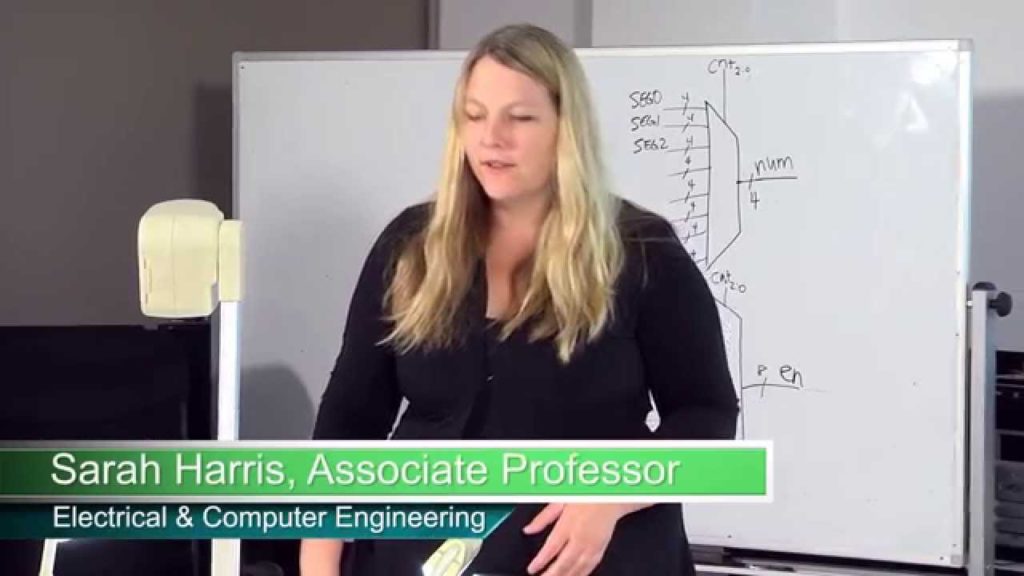
Slide Sarah Harris at a conference in Toronto about seminars in Russia, Ukraine and Kazakhstan:
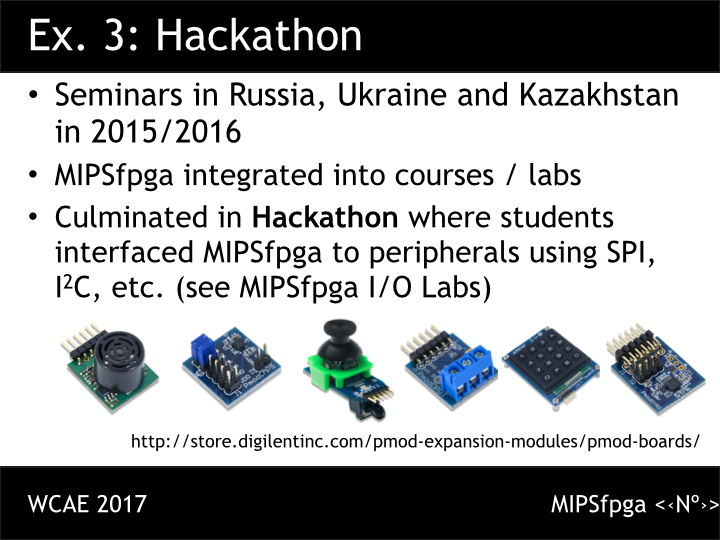
An excerpt from an article by a group of Europeans, Americans and Russian Ukrainians about these seminars (here it is, European integration!):
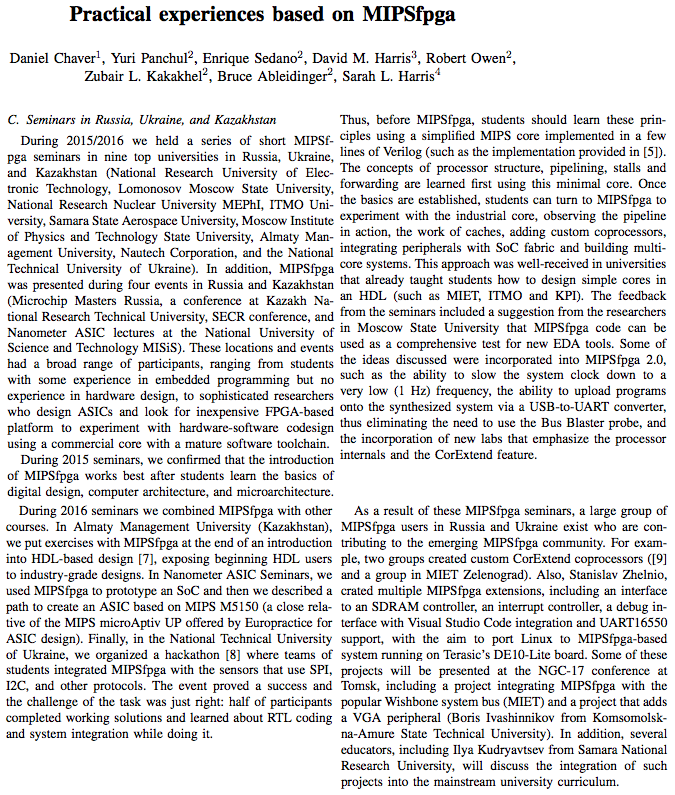
Russian translation of this article is on Habré
Now, about the seminar in Tomsk. The announced goal of the seminar: “In recent years, Russian companies have learned to write world-class programs, but how to achieve world-quality microchips so that today's students can design Russian chips at the level of advanced western companies such as Intel, Samsung and Apple in a few years? We invite you to two events in Tomsk, which are organized for a push in this direction:
1. Symposium-meeting for teachers on the exchange of experience in teaching electronics. Representatives of leading Russian universities, including MSU, MIPT, MIET, Russian and international companies, including MCST, Imagination Technologies and National Instruments, will arrive at it with reports.
2. School-seminar for students, graduate students and all interested in the introduction of Verilog and VHDL digital circuit description languages, processor architecture and micro-architecture, prototyping of systems on a chip using FPGA / FPGA and their connection with mass microcontrollers and embedded processors. For students and graduate students from Tomsk and Novosibirsk, this school is free.
Both events will be held September 18-22. Table with the program of the symposium, and contact information .
Creation history: the idea of a seminar in Tomsk originated last winter at this table, which is geographically located between Intel and AMD offices, with the employee of the University of California Santa Cruz (branch in Silicon Valley) Charles, an employee of the University of Arizona (and former employee of Motorola) Anatoly Imagination Technologies Yuri and AMD Timur employee:
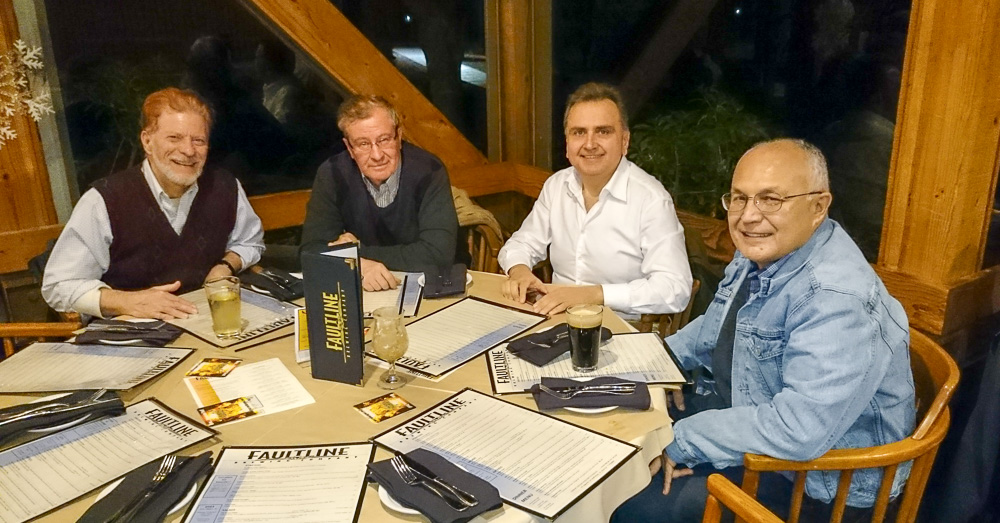
Meeting of some speakers in Moscow this summer:
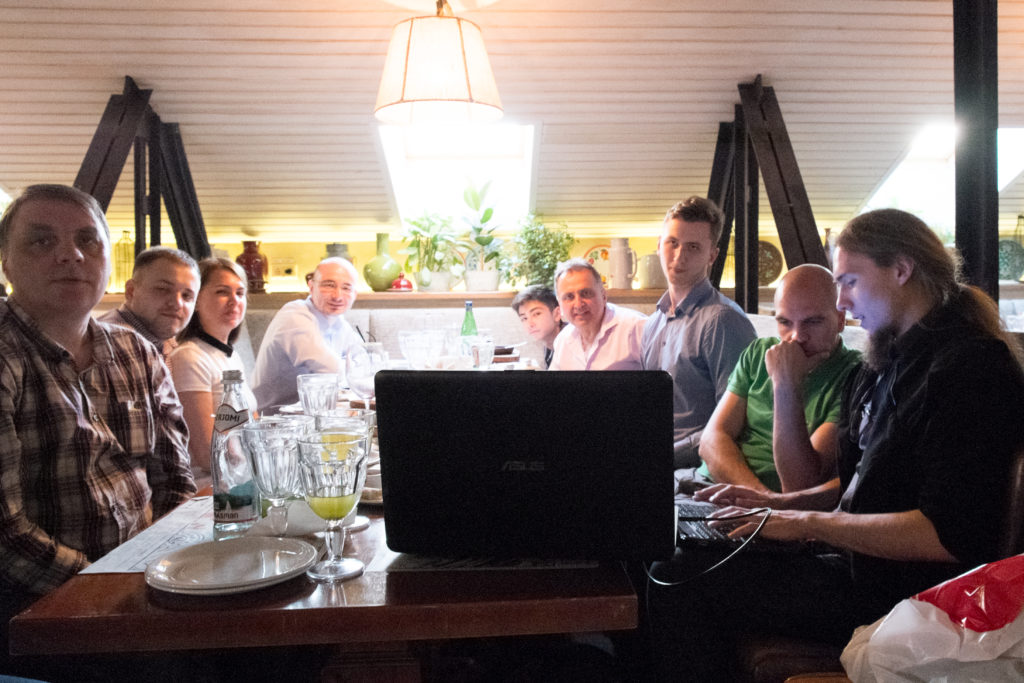
The next event is the arrival to Moscow of Robert Owen. Robert is in Russia for the eighth time (which is not surprising - he has been traveling everywhere for 23 years, first with missions from Texas Instruments, then Xilinx, ARM and Imagination). Here is Robert in one of the Russian universities in one of the previous visits:
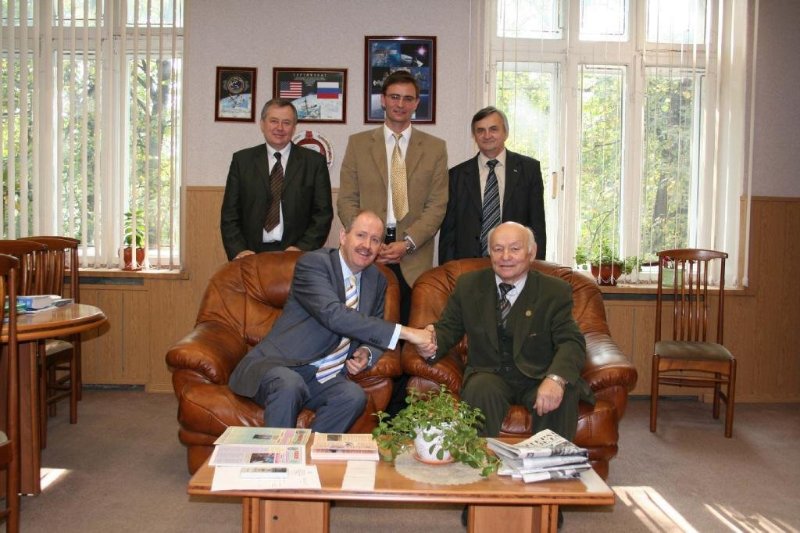
But the information about the new meeting:
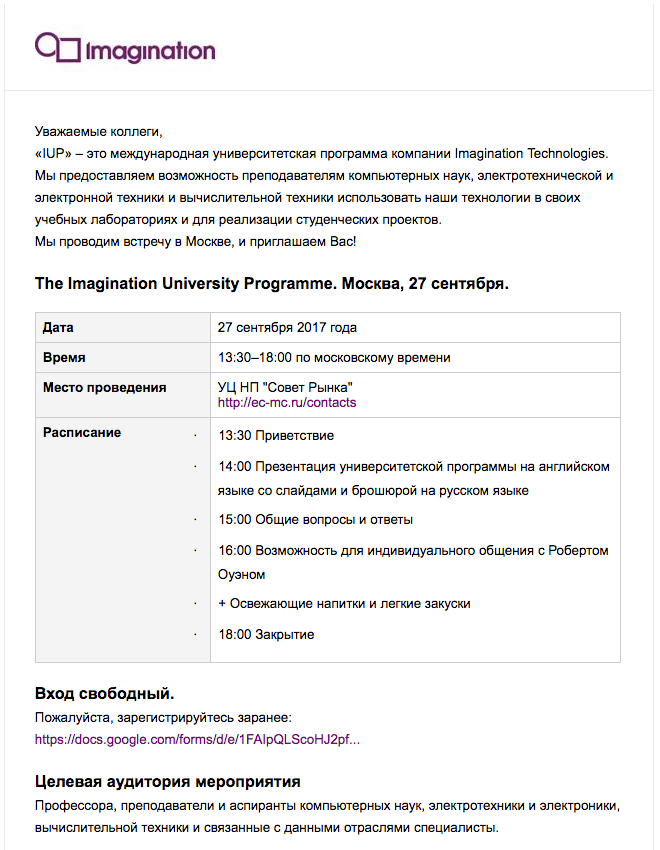
But Chubais on the background of the slide with ELVIS-NeoTek and Baikal Electronics, projects for which we need specialists with knowledge of the design of microcircuits. Chubais will talk about these projects on Thursday, September 14 :
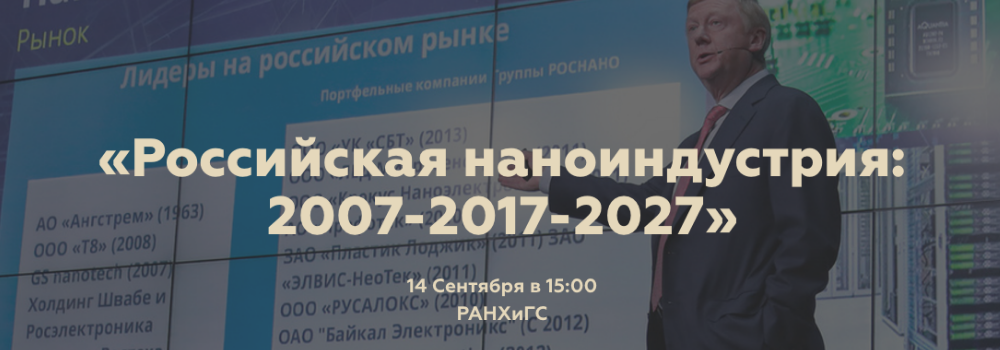
Then you ask: do students learn how to design chips, and where will they insert them? On this, Russian developers have hope for a highly fragmented chip market for the Internet of Things, about which there will also be a conference in Russia (compare with the American conference in Santa Clara on the same topic ):
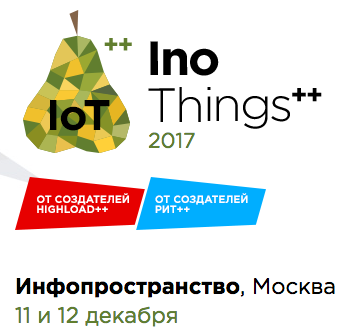
This morning I also found out about an activist who wants to organize a design conference on Verilog and FPGA in Kyrgyzstan. This development in the right direction - all the peoples of the Eurasian cultural space since the Middle Ages have been quick-witted, have given the world non-Euclidean geometers Omar Khayyam and Nikolay Lobachevsky very famous in the world as designers of high-end microcircuits. In the 21st century, this trend is a chance to reverse, and educational seminars, in combination with cooperation between universities and corporations, serve precisely these goals.
An important part of the experiments with MIPSfpga happened in Russia, Ukraine and Kazakhstan over the past two years - Sara Harris, professor at the University of Las Vegas, told about this at a conference in Toronto . MSU, MIPT, MEPI, MIET, ITMO and other leading universities took part in the workshops on this and related topics of chip design (Nanometer ASIC).
Now the experiment continues: this month, in addition to the conference in Tomsk, Robert Owen , a well-known consultant on university educational programs in the field of microelectronics, comes to Russia. Over the past 23 years, Robert Owen has visited hundreds of universities in Europe, Asia, America and even Africa, as a representative of Texas Instruments, ARM, Xilinx and Imagination. He helped universities put programs in the field of DSP, microcontrollers, embedded processors and systems on a chip.
')
All this activity is not an abstract education for the sake of education. The technology of developing microcircuits using Verilog and VHDL hardware description languages and using synthesized cores is the business of such Russian companies as ELVIS-NeoTek and Baikal Electronics, which will be discussed in a lecture this week by none other than Chubais .

About these and other events from the past and the future in more detail under the cut.
Sarah Harris, co-author of the popular textbook "Digital Circuit Design and Computer Architecture" :

Slide Sarah Harris at a conference in Toronto about seminars in Russia, Ukraine and Kazakhstan:

An excerpt from an article by a group of Europeans, Americans and Russian Ukrainians about these seminars (here it is, European integration!):

Russian translation of this article is on Habré
Now, about the seminar in Tomsk. The announced goal of the seminar: “In recent years, Russian companies have learned to write world-class programs, but how to achieve world-quality microchips so that today's students can design Russian chips at the level of advanced western companies such as Intel, Samsung and Apple in a few years? We invite you to two events in Tomsk, which are organized for a push in this direction:
1. Symposium-meeting for teachers on the exchange of experience in teaching electronics. Representatives of leading Russian universities, including MSU, MIPT, MIET, Russian and international companies, including MCST, Imagination Technologies and National Instruments, will arrive at it with reports.
2. School-seminar for students, graduate students and all interested in the introduction of Verilog and VHDL digital circuit description languages, processor architecture and micro-architecture, prototyping of systems on a chip using FPGA / FPGA and their connection with mass microcontrollers and embedded processors. For students and graduate students from Tomsk and Novosibirsk, this school is free.
Both events will be held September 18-22. Table with the program of the symposium, and contact information .
Creation history: the idea of a seminar in Tomsk originated last winter at this table, which is geographically located between Intel and AMD offices, with the employee of the University of California Santa Cruz (branch in Silicon Valley) Charles, an employee of the University of Arizona (and former employee of Motorola) Anatoly Imagination Technologies Yuri and AMD Timur employee:

Meeting of some speakers in Moscow this summer:

The next event is the arrival to Moscow of Robert Owen. Robert is in Russia for the eighth time (which is not surprising - he has been traveling everywhere for 23 years, first with missions from Texas Instruments, then Xilinx, ARM and Imagination). Here is Robert in one of the Russian universities in one of the previous visits:

But the information about the new meeting:

But Chubais on the background of the slide with ELVIS-NeoTek and Baikal Electronics, projects for which we need specialists with knowledge of the design of microcircuits. Chubais will talk about these projects on Thursday, September 14 :

Then you ask: do students learn how to design chips, and where will they insert them? On this, Russian developers have hope for a highly fragmented chip market for the Internet of Things, about which there will also be a conference in Russia (compare with the American conference in Santa Clara on the same topic ):

This morning I also found out about an activist who wants to organize a design conference on Verilog and FPGA in Kyrgyzstan. This development in the right direction - all the peoples of the Eurasian cultural space since the Middle Ages have been quick-witted, have given the world non-Euclidean geometers Omar Khayyam and Nikolay Lobachevsky very famous in the world as designers of high-end microcircuits. In the 21st century, this trend is a chance to reverse, and educational seminars, in combination with cooperation between universities and corporations, serve precisely these goals.
Source: https://habr.com/ru/post/337702/
All Articles